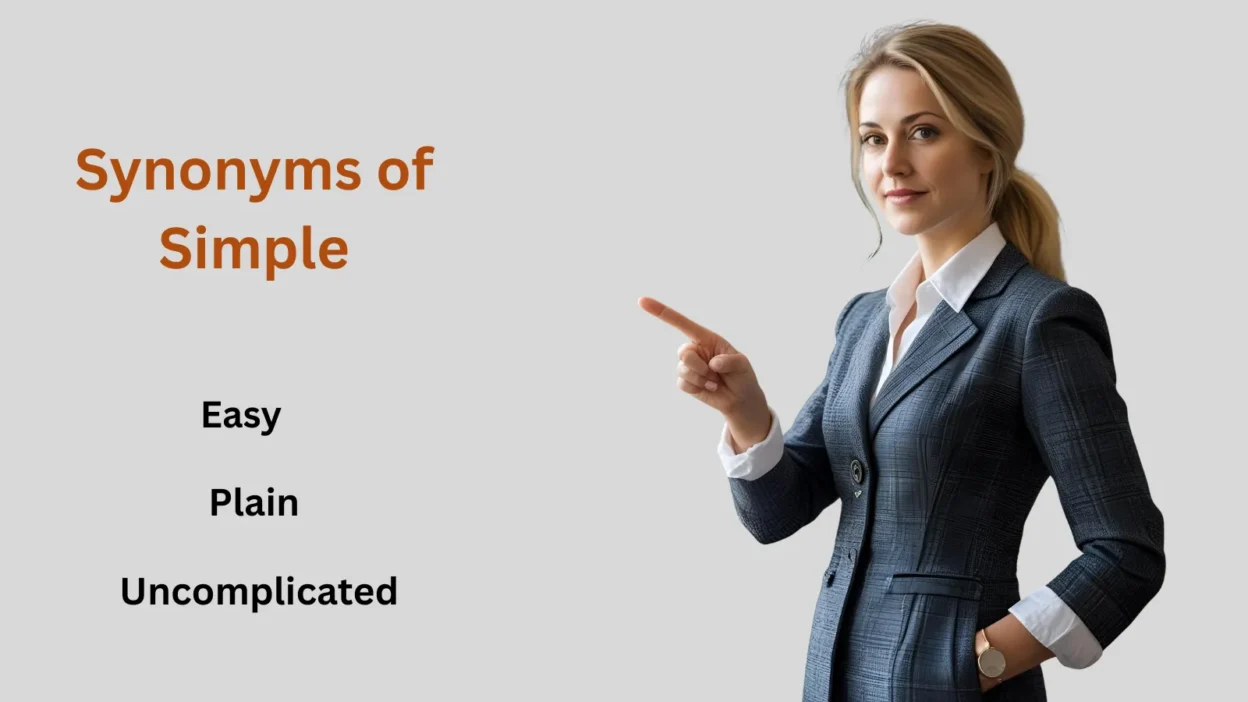The word “simple” gets used all the time, but what if you need something more precise or expressive? Whether you’re a student writing an essay or a writer crafting a clear sentence, repeating simple words can make your work feel flat or vague. That’s where knowing the right synonyms of simple comes in handy.
In this guide, we’ll explore powerful alternatives like basic, plain, clear, modest, and uncomplicated. Each synonym of simple brings its tone and nuance, perfect for both academic and creative writing.
Let’s find the right word that fits your message without making it more complicated.
What Does Simple Really Mean?
At its core, simple means easy to understand, not complicated, or without unnecessary additions. But it also carries other shades of meaning:
- Modest or unpretentious — something humble or basic.
- Reserved or shy — sometimes “simple” can describe a person who is quiet or unassuming.
- Plain or unadorned — free from decoration or complexity.
- Innocent or naïve — in older or literary use, simple can hint at a lack of sophistication.
Because of these nuances, the synonyms below focus on different aspects — from easy and clear, to modest and minimal, to plain and straightforward.
Synonyms of Simple and When to Use Them
1. Easy
Meaning: Something that requires little effort or skill.
Use when: Emphasizing how undemanding or straightforward something is.
Example: This recipe is really easy to follow for beginners.
2. Plain
Meaning: Without decoration, basic in appearance or style.
Use when: Describing something unadorned or not fancy.
Example: She wore a plain dress to the meeting.
3. Basic
Meaning: Fundamental, forming a base or starting point.
Use when: Highlighting the essential or elementary nature of something.
Example: You need to learn the basic rules before playing.
4. Modest
Meaning: Unassuming, moderate, or humble.
Use when: Referring to someone or something not boastful or extravagant.
Example: They live in a modest house on the outskirts of town.
5. Uncomplicated
Meaning: Not complex or difficult.
Use when: Stressing the lack of difficulty or complexity.
Example: The instructions are uncomplicated, so anyone can do it.
6. Clear
Meaning: Easy to perceive or understand.
Use when: Focusing on transparency or straightforwardness in communication.
Example: His explanation was clear and to the point.
7. Straightforward
Meaning: Direct and honest, without evasions.
Use when: Highlighting honesty or no-nonsense clarity.
Example: She gave a straightforward answer to the question.
8. Naïve
Meaning: Showing a lack of experience or sophistication.
Use when: Describing innocence or simplicity in a person’s worldview (can be slightly negative).
Example: He was naïve to trust the stranger so easily.
9. Minimalist
Meaning: Characterized by simplicity and the use of minimal elements.
Use when: Talking about design or style, focusing on simplicity and function.
Example: Her home has a minimalist aesthetic with clean lines and few decorations.
10. Effortless
Meaning: Achieved with ease, without strain.
Use when: Praising the smoothness or naturalness of an action or process.
Example: He makes playing the piano look effortless.
11. Elementary
Meaning: Basic, simple, or fundamental.
Use when: Referring to foundational knowledge or skills.
Example: Elementary math concepts are crucial for higher learning.
12. Unadorned
Meaning: Without embellishment or decoration.
Use when: Emphasizing simplicity in appearance or style.
Example: The building had an unadorned facade, but was elegant.
13. Clear-cut
Meaning: Easy to perceive or understand, distinct.
Use when: Highlighting decisiveness or obviousness.
Example: The rules were clear-cut and easy to follow.
14. Honest
Meaning: Truthful and sincere.
Use when: Describing straightforwardness with an ethical tone.
Example: She gave an honest assessment of the project.
15. Natural
Meaning: Existing in or derived from nature; not artificial or complex.
Use when: Talking about something genuine or unpretentious.
Example: He has a natural talent for drawing.
16. Unpretentious
Meaning: Not attempting to impress others with an appearance of greater importance.
Use when: Praising humility or modesty in style or behavior.
Example: Their unpretentious cafe feels welcoming and cozy.
17. Ordinary
Meaning: With no special or distinctive features.
Use when: Neutral or slightly dismissive tone, focusing on commonness.
Example: It was just an ordinary day at the office.
18. Transparent
Meaning: Easy to understand or detect; open.
Use when: Describing openness or clearness in communication or process.
Example: The company’s finances are transparent to all employees.
19. Unelaborate
Meaning: Not complicated or detailed.
Use when: Formal or literary contexts to denote simplicity.
Example: The design was unelaborate but effective.
20. Straight
Meaning: Direct, without deviation or complexity.
Use when: Informal, meaning simple or honest in communication or behavior.
Example: Give me a straight answer, no beating around the bush.
21. Modest
Meaning: Limited in scope or size; humble.
Use when: Emphasizing humility or small scale.
Example: They made a modest contribution to the charity.
22. Uncompounded
Meaning: Not combined with others; simple or singular.
Use when: Rarely used, more formal or technical.
Example: The chemical was uncomounded and pure.
23. Low-key
Meaning: Not elaborate, showy, or intensive; restrained.
Use when: Describing something modest or relaxed in tone or appearance.
Example: They had a low-key wedding with just close family.
24. Direct
Meaning: Straight to the point, without deviation.
Use when: Describing communication or action with clarity and honesty.
Example: She gave a direct reply to the criticism.
25. Sincere
Meaning: Genuine, honest, without pretense.
Use when: Emphasizing authenticity in feelings or communication.
Example: His apology was sincere and heartfelt.
26. Basic
Meaning: Fundamental or elementary.
Use when: Describing foundational skills or elements.
Example: You need to master the basic techniques first.
27. Clean
Meaning: Free from clutter or complexity; pure.
Use when: Talking about design, style, or logic.
Example: The presentation had a clean layout that was easy to follow.
28. Undemanding
Meaning: Not requiring much effort or attention.
Use when: Describing tasks or situations that are easy-going.
Example: The job is undemanding and perfect for beginners.
29. Uncomplicated
Meaning: Simple and easy to understand or deal with.
Use when: Highlighting straightforwardness in process or ideas.
Example: The recipe is uncomplicated and quick to prepare.
30. Homely
Meaning: Plain or simple in appearance; cozy and comfortable (can be negative in appearance, positive in atmosphere).
Use when: Describing something comfortable but plain.
Example: They enjoyed the homely atmosphere of the small café.
How to Choose the Right Synonym of Simple?
Choosing the right word depends on several factors:
- Tone: Do you want a neutral, positive, or slightly negative tone? For example, naïve implies innocence but can sound negative, while modest has a positive humility.
- Context: Are you describing a task, a style, a person’s personality, or a design? Use easy or undemanding for tasks, minimalist or clean for design, and modest or unpretentious for personality.
- Emotional flavor: Words like sincere, honest, and straightforward add emotional warmth or integrity, while plain and ordinary might feel bland or neutral.
- Formality: Some words like unelaborate or uncompounded are more formal or technical, while low-key or straight are casual.
Cultural and Emotional Contexts
- In Western culture, simplicity often suggests honesty, humility, or elegance (think minimalism in design).
- In literature, simple characters might be portrayed as innocent or naïve, but also genuine.
- Some synonyms like homely can be positive or negative depending on context, describing comfort versus plainness.
- Modest carries positive connotations related to humility, which can be culturally valued in many societies.
Conclusion:
Using the right synonyms of simple—like basic, plain, modest, or uncomplicated—can make your writing more accurate and engaging. Each word brings its subtle meaning, helping you avoid repetition and better match the tone you want.
If you’re simplifying complex ideas or describing something minimal, choosing the right word keeps your writing clear, strong, and intentional.
Words like these allow you to express simplicity without sounding repetitive or vague. So next time you reach for “simple,” take a moment to choose the alternative that fits your message best.



